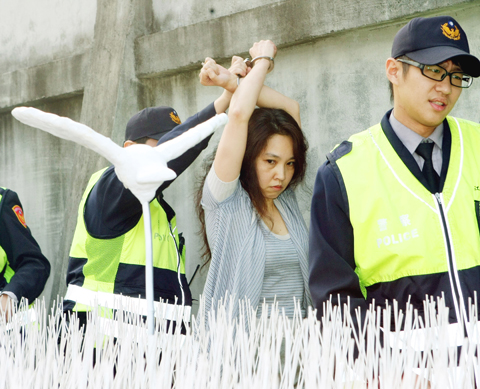President Ma Ying-jeou (馬英九) said yesterday the government would consider transforming all international covenants into domestic laws to demonstrate Taiwan’s determination to promote human rights.
The Act Governing International Covenant on Civil and Political Rights and the International Covenant on Economic, Social and Cultural Rights (公民與政治權利國際公約及經濟社會文化權利國際公約施行法) made the two covenants part of domestic law as of Thursday, and the government would look into turning all international covenants into domestic laws, Ma said.
“The government will conduct a thorough review on international covenants that Taiwan was unable to participate in and ponder the possibility of turning them into domestic laws,” Ma said when meeting with representatives from legal groups at the Presidential Office.

PHOTO: CNA
Ma signed the covenants in May and sent them to the UN Secretariat but they were returned because the country left the UN in 1971.
Ma said the Ministry of Justice would also amend related regulations that violated the two covenants in two years, to demonstrate Taiwan’s willingness to participate in the international community and perform its international obligations.
Ma lauded the ministry for allowing suspects to see the depositions simultaneously starting on Jan. 1 as a means to protect the rights of the suspects.
In response to the representatives’ advice to establish a judicial reform committee under the Presidential Office and to publish the progress of judicial reform every three months, Ma promised to ask the Justice Ministry and Judicial Yuan to present a practical strategy in one month.
In other news, at a separate setting yesterday, former vice president Annette Lu (呂秀蓮) lashed out at the Ma government, accusing it of trying to cover up the ugly acts of the former Chinese Nationalist Party (KMT) regime by using works of art to beautify the Taiwan Human Rights Memorial Park.
Lu called on the public not to visit the park until the government restored its original appearance.
The Council of Cultural Affairs organized an exhibition at the memorial park on Thursday, including a public art installation. Chen Chia-chun (陳嘉君), wife of anti-Chen Shui-bian (陳水扁) movement leader Shih Ming-teh (施明德), tried to attack the artwork and was arrested.
Chen criticized artist Yu Wen-fu (游文富) for displaying his work where Wang Hsi-ling (汪希苓), former head of the Military Intelligence Bureau was kept under house arrest for ordering the murder of Chinese-American writer Henry Liu (劉宜良). Chen said that placing the art work there was the same as commemorating Wang.
“The memorial held many dissidents including myself and tortured us during the martial law period, and it is ironic that President Ma allowed the government to beautify the memorial with public art works and dancing,” Lu said during a human rights forum held by the Yushan Media.
Lu urged Ma to face up to the old KMT regime’s crimes and called for a boycott of the memorial until it is restored to its original state.
Before becoming the Taiwan Human Rights Memorial Park, Taipei’s Jingmei military detention center was used to try and detain political dissidents before sending them to prison or to be executed from the late 1960s to the 1980s.
ADDITIONAL REPORTING BY CNA

EVA Airways today confirmed the death of a flight attendant on Saturday upon their return to Taiwan and said an internal investigation has been launched, as criticism mounted over a social media post accusing the airline of failing to offer sufficient employee protections. According to the post, the flight attendant complained of feeling sick on board a flight, but was unable to take sick leave or access medical care. The crew member allegedly did not receive assistance from the chief purser, who failed to heed their requests for medical attention or call an ambulance once the flight landed, the post said. As sick

A drunk woman was sexually assaulted inside a crowded concourse of Taipei Railway Station on Thursday last week before a foreign tourist notified police, leading to calls for better education on bystander intervention and review of security infrastructure. The man, surnamed Chiu (邱), was taken into custody on charges of sexual assault, taking advantage of the woman’s condition and public indecency. Police discovered that Chiu was a fugitive with prior convictions for vehicle theft. He has been taken into custody and is to complete his unserved six-month sentence, police said. On Thursday last week, Chiu was seen wearing a white

EVA Airways, one of the leading international carriers in Taiwan, yesterday said that it was investigating reports that a cabin crew manager had ignored the condition of a sick flight attendant, who died on Saturday. The airline made the statement in response to a post circulating on social media that said that the flight attendant on an outbound flight was feeling sick and notified the cabin crew manager. Although the flight attendant grew increasingly ill on the return flight, the manager did not contact Medlink — a system that connects the aircraft to doctors on the ground for treatment advice during medical

The Taichung District Court yesterday confirmed its final ruling that the marriage between teenage heir Lai (賴) and a man surnamed Hsia (夏) was legally invalid, preventing Hsia from inheriting Lai’s NT$500 million (US$16.37 million) estate. The court confirmed that Hsia chose not to appeal the civil judgement after the court handed down its ruling in June, making the decision final. In the June ruling, the court said that Lai, 18, and Hsia, 26, showed “no mutual admiration before the marriage” and that their interactions were “distant and unfamiliar.” The judge concluded that the couple lacked the “true intention of